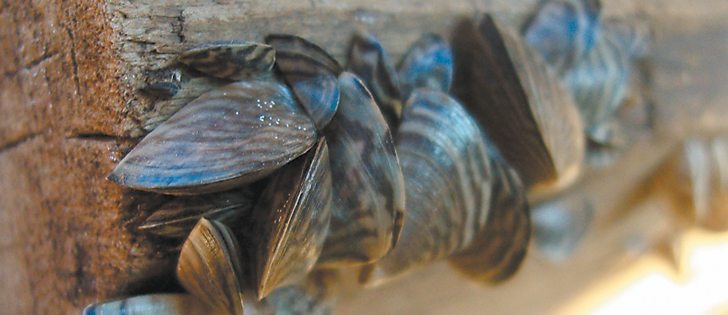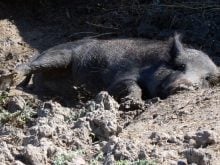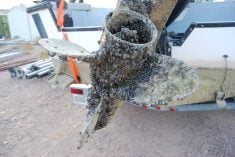Prairie effort | Officials mobilize to prevent the entry of invasive species into prairie waters
MILK RIVER, Alta. — Photos of zebra mussels show the mollusks blocking pipes and clinging to infrastructure.
It isn’t a great mental leap to imagine them clogging Alberta’s irrigation pipes, pivots and canals or wreaking havoc in Saskatchewan and Manitoba rivers, lakes and municipal water systems.
“Once they’re here, they’re impossible to eradicate,” said Bill Dolan of Alberta Tourism, Parks and Recreation.
“These mussels cost millions of dollars each year.”
Dolan is involved with the Crown Managers Partnership, which works with government and industry to prevent zebra and quagga mussels from invading Alberta, British Columbia, Saskatchewan and Manitoba.
Read Also

Farming Smarter receives financial boost from Alberta government for potato research
Farming Smarter near Lethbridge got a boost to its research equipment, thanks to the Alberta government’s increase in funding for research associations.
The invasive mussels are native to Eastern Europe’s Caspian Sea region. They were found in Canada in 1988 and are thought to have hitchhiked on seagoing vessels that came up the St. Lawrence Seaway and into the Great Lakes.
Since then, the mussels have spread through river systems to large portions of the eastern United States and have also been found in Lake Mead in the southwestern U.S., where many prairie snowbirds spend their winters.
Dolan said that’s a two-day drive from Alberta, and mussels travel on boats and in ballast, which creates a risk of spread to the Prairies.
“There’s no indication at this point that they’ve made it into the (Alberta) system,” Dolan told an April 11 meeting of the Milk River Watershed Council.
“I think you can all appreciate this isn’t just about Alberta. We have three other provinces around us, B.C., Manitoba and Saskatchewan, that from a mussel point of view are also free.”
However, the mussels have been detected and deleted on several boats entering Alberta, and a scare in B.C.’s south-central Shuswap Lake last year appears to have involved mussels already dead upon entry.
Keeping the mussels out of the Prairies may seem a daunting task, given the wealth of recreational opportunities and ease of travel across borders.
“I don’t think it inevitable. I think if there’s a will, there’s a way, but even if it did get here, I think the more we can delay it the better off we are economically, environmentally and in terms of other technologies,” Dolan said in a later interview.
“The more we can keep it out of Alberta, it buys time. Maybe there’ll be other ways to treat any infestation that isn’t available today.”
The partnership is developing a multi-phase plan to prevent mussel incursions that will initially be centered in southwestern Alberta, including Waterton Lakes National Park and surrounding region, an area dubbed the Crown of the Continent.
Education and awareness are key initial elements, Dolan said.
Travellers with boating and aquatic gear will be told about the mussels and the potential harm they present.
That includes destruction of fish habitat, reduced biodiversity and other environmental and economic damage.
Boat owners will be asked to clean, dry and drain their equipment.
Zebra mussels come in many sizes and can hide in cracks and crevices.
Females can lay up to one million eggs per year, which can hitch rides in water ballast.
Mussels can survive up to 30 days outside water, so boaters will be encouraged to consider dry dock for that time if there is a risk of spread.
Boat inspection stations operate in Montana and Idaho, and a third will operate at Waterton, said Dolan. More inspection points are expected to be organized once the strategy is expanded.
Multiple levels of government and departments within government will have to be involved if the strategy is to succeed.
“This is one issue, whether you’re looking at it through an environmental set of glasses or from an economic or from a social recreation perspective, everyone sees the concern and wants to make sure, for the most part, that we don’t get those species here,” Dolan said.
“It’s one that it’s very easy to find a solidarity around and have everyone pulling together in the same direction.”
Among the first strategies implemented will be a phone number through which inspection agencies, groups and individuals can report zebra mussel sightings or suspicions.
It is 855-336-BOAT, but calls to that number April 15 indicated it is not yet in service.


















